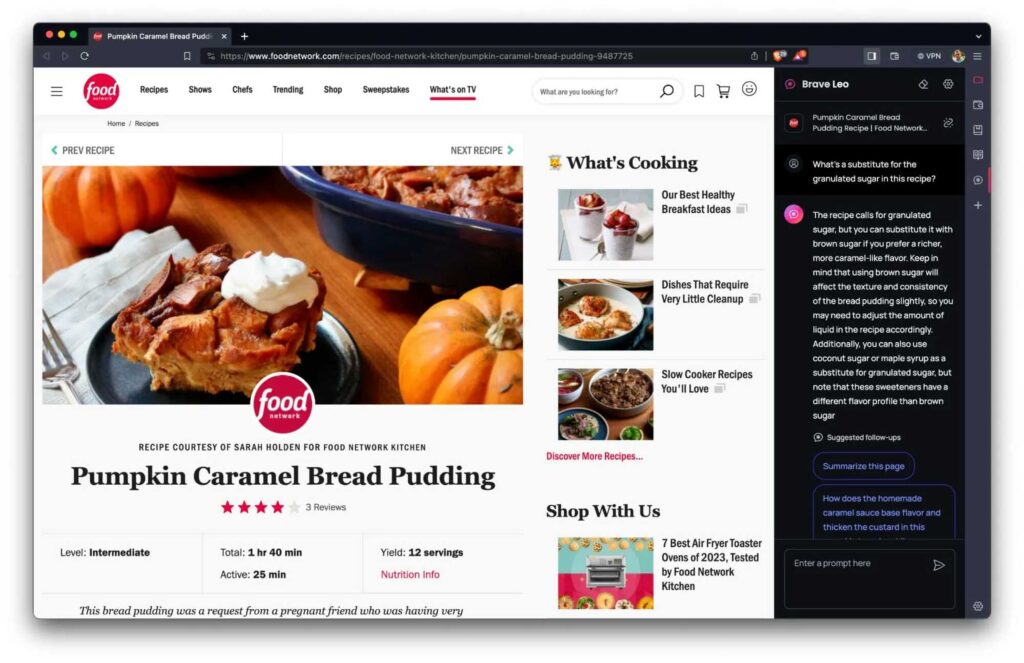Privacy-focused web browser Brave started rolling out its native AI assistant Leo, promising conversations that are “private, anonymous, and secure.” The company first introduced Leo via its Nightly experimental channel in August and has been testing it ever since.
In a blog post, Brave said Leo is now available for free to all desktop users of its web browser starting Nov. 2. A premium version costs $15 per month. The chatbot is rolling out in phases over the next few days” and will be available on Android and iOS “in the coming months.”
Brave’s AI browser assistant Leo is being rolled out over the next few days to all desktop users!
Let’s talk about what you can expect from this powerful, privacy-preserving tool… pic.twitter.com/lkS35PYbsl
— Brave Software (@brave) November 2, 2023
Leo claims ‘unparalleled privacy’
According to Brave, Leo can translate, analyze, create summaries of web pages and videos, and rewrite pages, just like other AI chatbots such as Google Bard and Microsoft’s Bing Chat. What separates Leo from other AI browser assistants is that it is more private, Brave says.
The open-source browser developer said conversations with Leo are not recorded or used to train AI models and that “no account or login is required.” Brave Software also explained that it doesn’t collect IP addresses or retain personal data that can identify a user.
“Your chats with Leo are private, anonymous, and secure,” the company said on X, formerly Twitter.
The paid version of Leo can also analyze pages behind firewalls, paywalls, and content that may otherwise be unavailable. In the blog post, Brave CTO and cofounder Brian Bondy said the chatbot “adheres to Brave’s core values and is built with privacy by design.”
“User inputs are always submitted anonymously through a reverse proxy to our inference infrastructure, giving users an AI experience with unparalleled privacy,” he said. Chats “are discarded immediately after the reply is generated and are not persisted on Brave’s servers.”
Also read: Brave Embraces AI Era With Summarization Feature in Search
According to Bondy, Leo is more than just a chatbot; it’s a companion that helps people navigate the Internet more easily.
“Leo ‘understands’ the current page you’re visiting; it’s the next best thing to talking directly with the author,” he said. “Leo can independently analyze and reason about pages, free of the author’s biases.”

More features for premium subscribers
The free version of Leo is powered by Llama 2, an open-source large language model (LLM) developed by Meta for commercial and research purposes. Leo Premium is based on Anthropic’s Claude Instant and can produce longer and more detailed answers.
“We tested several systems, and Anthropic was the best fit for this initial release with their speed and advanced conversational abilities,” Bondy said, as reported by Decrypt. He added that Anthropic used Brave’s Search API to train and optimize Claude 2, its latest AI model.
Brave Leo is free by default, the company said, and Leo Premium subscribers get access to additional large language models for “higher quality conversations, higher rate limits, priority queuing, and early access to new features.”
“Leo is built in a way that many different models can be plugged into the feature,” Bondy said.
“We believe that more models will be offered over time and that users should be able to choose among them,” he added.
Experts have warned that generative AI chatbots like ChatGPT can create false information, promote eating disorders, and even aid in planning terrorist attacks. Bondy said Leo filters harmful responses and will not answer dangerous questions, as defined by Brave’s policies.









 and then
and then